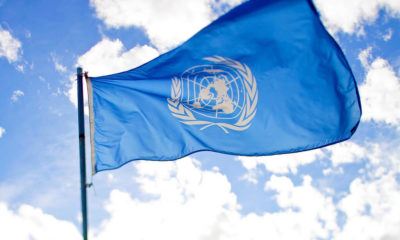Africa
Gabon’s Oil Sector Urged to Move CSR Beyond Token Gestures
Gabon’s oil sector has a strong framework for Corporate Social Responsibility (CSR), but its implementation is often reduced to one-off sponsorships or donations rather than structured, measurable programs aligned with national priorities like health, education, and economic diversification. Now, there are calls for clearer CSR definitions and long-term development rather than PR exercises.

During a recent visit to Port-Gentil, Gabon, Sosthène Nguema Nguema, Gabon’s Minister of Petroleum and Gas, delivered a tough message to players in the oil and gas industry, aiming to boost and energize the sector. His remarks, seen as objective and impactful by the public, set the direction by outlining “objectives, adjustments, and expectations for the future,” while highlighting “the sector’s resilience and expertise despite the absence of major recent discoveries.”
Among the topics addressed was Corporate Social Responsibility (CSR). On this point, he reminded stakeholders that “CSR funds must be domiciled within the national territory.”
With the necessary perspective, it seems useful to seize this moment to highlight and examine the stakes of an effective implementation of oil-sector CSR in Gabon — one that can create a lasting impact for the benefit of the local community.
In Gabon, and particularly in the oil sector, Corporate Social Responsibility has become an omnipresent buzzword — but one often misunderstood by the public. Too often, for some operators, it is reduced to a few sponsorships, philanthropic acts, or occasional community relations gestures. These actions are visible but rarely part of a long-term strategy capable of transforming local communities in a lasting way.
In reality, at its core, CSR is above all an aspiration to translate the principles of sustainable development into the operations and governance of companies. A broader definition gives CSR the capacity to combine economic performance, social performance, and environmental performance. It is therefore a cross-cutting approach that should provide decision-makers with information to guide choices. In some contexts — such as Gabon’s Petroleum Code — the application of much of its content can be made compulsory, with penalties imposed for violations or failures.
Indeed, this legal framework does exist in Gabon. The 2019 Hydrocarbons Code, supplemented by its implementing decrees, introduces clear obligations in terms of local content, training, skills transfer, and procurement from Gabonese companies. A General Directorate within the central services of the Ministry of Petroleum and Gas was even created and staffed in January 2025. The government’s dual objective was for oil wealth to benefit the population more directly and for operators to help strengthen the local economic fabric.
Gabon Seeks to Go Beyond Tokenism
The problem is that the boundary between CSR and one-off actions in Gabon remains blurry. Giving football jerseys to a local team or sponsoring a concert cannot replace a structured program for professional integration, support for local SMEs, or rehabilitation of impacted sites. Societal performance in CSR must be measurable and auditable, with clear performance indicators. Annual reports to the public should be required to feed the ministry’s dashboard, ensure transparency, and limit shortfalls or deficiencies in reporting to supranational bodies.
In a post-transition context where social expectations are high and Gabon’s communities demand tangible benefits, this confusion is dangerous. It fuels frustration, tension, and sometimes a loss of trust between operators, the state, and the population.
This tension reached a peak in July 2023 with a tragic hostage-taking by a disgruntled local resident near the Coucal production site in Gabon. The incident led to an exceptional intervention by the Defense and Security Forces, with a fatal outcome for the perpetrator and injuries among the security forces. The risk of similar incidents recurring is real — but not insurmountable.
Compounding the problem, in the absence of new onshore discoveries and with aging main production fields, operators’ room to maneuver is severely limited. Substituting for the state in its core sovereign functions remains a risk and a boundary no operator can afford to cross.
This is why the PID (Provision for Diversified Investments), PIH (Provision for Hydrocarbons Investment), and FDCL (Local Communities Development Fund) mechanisms represent serious levers for triggering a lasting transformation in how the country can balance control over its resources with ensuring the population benefits from them — without foregoing the much-needed contributions of potential investors in the sector.
It is therefore neither too late nor too early to change Gabon’s CSR course. This could be achieved through three major levers:
Clarify CSR in Gabon
Draw a clear distinction between philanthropy, sponsorship, and genuine corporate social responsibility, with measurable objectives embedded in oil contracts. Transform the General Directorate of Local Content into the General Directorate of CSR (local content being an operational component of CSR). One of the missions of this unit would be to maintain a permanent database on the societal performance of companies operating in the sector, for example to support and facilitate the work of the National EITI Coordination in preparing its annual reports.
Align CSR With Gabon’s National Priorities
Direct social investments toward health, education, training, energy transition, and economic diversification. Partnerships could be established with organizations such as IGAD (Gabonese Institute for Development Support), ANPI (National Agency for the Promotion of Investments), BCEG (Bank for Trade and Entrepreneurship of Gabon), and ANPE (National Employment Promotion Agency) to support this effort.
Strengthen Local Content
Support Gabonese SMEs so they can meet the technical standards of the sector while creating sustainable jobs. An interesting synergy is already in place with CEPAG (Convention of Indigenous Oil Companies of Gabon), which works to prioritize indigenous entrepreneurs in accessing oil-sector markets. The issue of precarious employment for Gabonese workers remains, however. The abusive use of subcontracting, wrongful dismissals, and career disruptions for national professionals following asset sales or transfers exacerbate this insecurity — a problem highlighted and condemned by the Minister of Petroleum and Gas during his visit to Port-Gentil.
The National Oil Company, which is poised to become the country’s leading producer in light of recent acquisitions, should also rise to the level of its ambitions and CSR obligations.
In short, if the above commitments are integrated into contractual clauses and monitored through transparent reporting, CSR will no longer be seen as a public-relations exercise or mere window dressing, but as a genuine driver of inclusive development.
Gabon has a strategic advantage: a solid oil sector and a legal framework already in place. What is missing is the collective will to make it an engine for social and economic transformation. CSR is not a luxury or an option. It is a responsibility. And in a country where every barrel counts, it is urgent that every action count as well.
__
(Featured image by Arvind Vallabh via Unsplash)
DISCLAIMER: This article was written by a third party contributor and does not reflect the opinion of Born2Invest, its management, staff or its associates. Please review our disclaimer for more information.
This article may include forward-looking statements. These forward-looking statements generally are identified by the words “believe,” “project,” “estimate,” “become,” “plan,” “will,” and similar expressions. These forward-looking statements involve known and unknown risks as well as uncertainties, including those discussed in the following cautionary statements and elsewhere in this article and on this site. Although the Company may believe that its expectations are based on reasonable assumptions, the actual results that the Company may achieve may differ materially from any forward-looking statements, which reflect the opinions of the management of the Company only as of the date hereof. Additionally, please make sure to read these important disclosures.
First published in Gabon Actu. A third-party contributor translated and adapted the article from the original. In case of discrepancy, the original will prevail.
Although we made reasonable efforts to provide accurate translations, some parts may be incorrect. Born2Invest assumes no responsibility for errors, omissions or ambiguities in the translations provided on this website. Any person or entity relying on translated content does so at their own risk. Born2Invest is not responsible for losses caused by such reliance on the accuracy or reliability of translated information. If you wish to report an error or inaccuracy in the translation, we encourage you to contact us.

-

 Crypto2 weeks ago
Crypto2 weeks agoBitcoin Rebounds Above $70K as Crypto Markets Show Fragile Signs of Recovery
-

 Crypto2 days ago
Crypto2 days agoIntesa Sanpaolo Signals Institutional Shift With Major Bitcoin ETF Investments
-

 Biotech1 week ago
Biotech1 week agoEurope Launches Personalized Cancer Medicine Initiative
-

 Crypto5 days ago
Crypto5 days agoBitcoin Wavers Below $70K as Crypto Market Struggles for Momentum

























